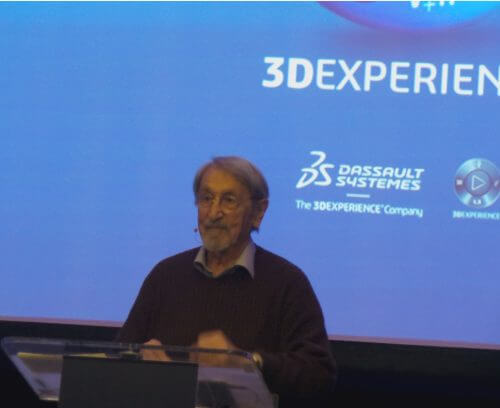Prof. Karpelos from Harvard University, the partner of Prof. Aryeh Varschel and Prof. Michael Levitt for the 2013 Nobel Prize in Chemistry, said these things at the "Science in the Age of Experience" conference that Dassault Systèmes is currently holding in Boston.

The discovery of personalized medicine will only be possible through simulation like this
Prof. Martin Karpelos from Harvard University, a partner of Prof. Aryeh Varschel and Prof. Michael Levitt for the 2013 Nobel Prize in Chemistry, said yesterday. Karpelos said these things at the "Science in the Age of Experience" conference that Dassault Systèmes is currently holding in Boston. At the conference, two divisions of Dassault Systèmes joined together: SIMULIA and BIOVIA.
Karpelos is a seasoned user of in silico methodologies and Dassault simulation systems in modeling complex chemical systems and chemical reactions. Modeling and simulation has moved from being used only by researchers in specialized fields, to the mainstream of modern chemistry and structural biology. Indeed, the emphasis of many lecturers throughout the conference was on the need to understand what is happening at all levels from the quantum level to the product or medicine in the macro world that we can see, feel and use. The four areas that the conference tracks focused on were materials engineering, precision medicine, bottom-up manufacturing and the Internet of Things.
According to Karpelos, there is extensive scientific interest in understanding the origin of the catalytic power of enzymes at the molecular level. While theoretical hypotheses and even experiments and a computational approach are commonplace, they must still be critically examined. Now Karpelos and the researchers in his laboratory at Harvard University have presented a dynamic simulation linking the vibrations of the molecule and the chemical reactions.
According to him, nature is very efficient in the use of energy in all basic processes, so it will be possible to learn from the simulation how industrial processes can be carried out efficiently. Target scanning for drugs is also an area where simulation can be used. In a lecture demonstration, he showed an enzyme responsible for returning sugar to the blood by the cells that reject it, and said that silencing the gene that expresses this enzyme can help treat type 2 diabetes patients.
One of the biggest problems in the pharmaceutical industry is that a very high percentage of the total number of drugs that start from a promising molecule fail to reach or pass the clinical trials stage, either due to toxicity (it is important that the drug treats the medical problem and does not kill the patient beforehand.
If in the fifties it was possible to develop 50-60 drugs for a billion dollars, today it is impossible to develop even one. Methods for discovering methods for finding LIGANDS have greatly improved, but they have actually led to a decrease in the efficiency of the process. An experiment in the simulation of all chemical processes - from the quantum level (jumps and oscillations) to the level of impact on the body and to find out what the non-toxic drugs are already on the computer and save both time and a lot of money.
Prof. Karpelos later spoke about personalized medicines and the need to analyze the genome of a large population in order to develop medicines that would suit a certain profile of patients and not for the masses as is the case today, which leads to a low cure rate, although new medicines are constantly being released for many types of cancer, they could have been More effective if they are given to those who are suitable for them from the genetic point of view. Here, too, simulation can help, because data science can be mobilized and enable analysis of the genomes.
Karpelos, who became famous after developing software for the simulation of large biological molecules together with Aryeh Warschel and Michael Levitt, continues to this day to collaborate with Prof. Warschel, he is a veteran user of Dassault's simulation systems in their various incarnations for about thirty years. The CEO of Dassault Systèmes, Bernard Charles, said that the developments of Prof. Karpelos in the field of molecular biology still bring royalties to Harvard University from any software that contains his contributions. According to Charles (which we will report in detail in a separate article), the partnership of the academy in developing simulations for the various fields of science is important, because scientific and industrial simulations should contain all possible information about the phenomenon being studied. According to him, due to the decrease in the rate of donations to universities, this can be a good source of income for them and also help advance human knowledge.
More of the topic in Hayadan:
